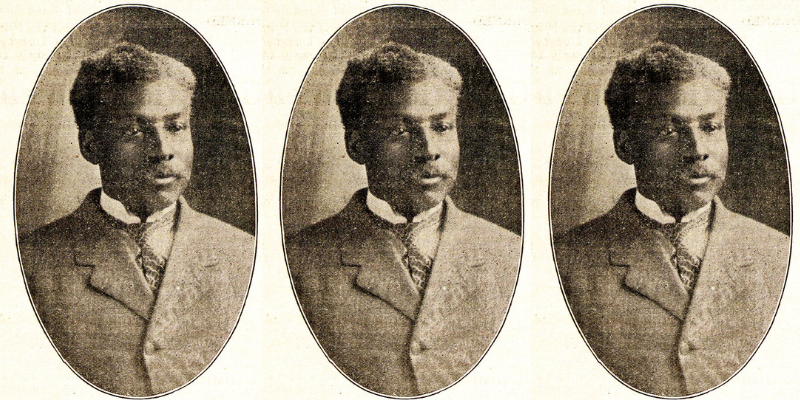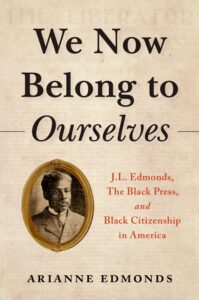
Against Erasure: Preserving the Memory of Black Communities in Los Angeles and Across the Country
Arianne Edmonds on the Intellectual and Political Legacy of Her Great-Great-Grandfather, Jefferson Lewis Edmonds
In my grandma’s middle room, there are six long wooden shelves that house my great-great-grandfather Jefferson’s personal library. You’ll find Arabian Nights, the Iliad and Odyssey by Homer, and the original printing of the Souls of Black Folks by W. E. B. Du Bois. I’ve passed these books thousands of times. My cousins Naqeeb, Khalid, and I would reenact Xena: Warrior Princess fighting scenes using old Christmas paper rolls as swords and cut-out paper plates as her infamous Chakram.
I was of course Xena; my only-child Leo moon wouldn’t let me play a supporting character—ever. There’s a dusty old domino set sitting on the top shelf, a ceramic pair of bears playing on a seesaw, and my grandma’s stuffed Dobermann dog sitting watch over the books in our family library.
Citizenship is a direct link to lineage, and the Black press served as an attempt to create a record and an account of our existence.
We bumped up against those bookshelves hundreds of times and placed our cranberry apple Juicy Juice boxes on the shelves over the years. Along the side of the wall near the bookshelves, my dad would measure our height every year and mark our initials. Today, after thirty-five years, the etched record of our yearly sprouting is still documented in blue and black ink. The casual nature of these books was certainly a statement about the legacy of our family. It was just there. It was important enough to keep and preserve and be respected, but it wasn’t revered. Nor would these books ever be added to the yard sales my grandma and my Aunt Marla would host every summer on the front lawn. They were just part of the fabric of the house, like the mid-century modern light fixtures in the front room or my grandpa’s Don Ho cassette tapes collecting dust in the back guest room. It all just sat there, not to be engaged but not to be discarded. It sat there waiting. Waiting for me. Waiting to be explored. Waiting to be loved on. I pulled out the match, but my dad set the fire. He taught me how to care for our archive, the value of it. He showed me how and when we’d start sharing the brilliant mind, life, and legacy of Jefferson Lewis Edmonds.
I went looking for my great-great-grandfather, Jefferson Lewis Edmonds, in 2009. I did it because I wanted to be closer to my dad. My parents split when I was pretty young. By the time I was thirteen my mom and I had moved to Atlanta, just over 2,000 miles away from the City of Angels and the place my family had made their home since the 1880s. Researching and piecing together our family history became something that helped close the gap from the years and miles between my dad and me. When we couldn’t talk about all the life that was missed by being apart for so long, we would fill the air with stories of Jefferson and his newspaper, The Liberator—and how we’d make sure his legacy in Los Angeles would be remembered. Jefferson helped us find our way back to one another.
My father’s side of the family always emphasized the importance of education, investing in local politics, and sticking to traditions. These were values I had to grow into. Becoming a mother helped me understand that those values and structures were all powerful forms of love and stability, and long-lasting acts of service. I didn’t know that digging into my great-great-grandfather’s library, reading his notes, and spending time with our family newspaper would help illuminate where those core values came from. I went looking because I was curious and wanted to feel a connection to my dad. What I found was that the seed Jefferson planted for us almost 140 years ago was still taking root and still blooming in me, my dad, and my whole family.
*
So many Black families in the United States can only trace their history back to their grandparents. The erasure of our stories and records is devastating. We have movements like Black Lives Matter that help address the brutality and violence against our bodies and psyche. We’ve had movements like the civil rights era in the 1960s, that attempted to address inequality and demand policy changes and national political power. Currently we see a revolution around Black rest, like the powerful work of the Nap ministry led by Nap Bishop Tricia Hersey, reminding Black people in America to exit the hustle culture train and focus on mental health and personal dreams. The last frontier that our Black social movements have not been able to address is how we should restore our history, our memories, and our family lore. What becomes of them? So many of our stories start and end with enslavement. Unknowingly I set out to change that narrative and help unearth Jefferson’s legacy and that of so many Black Angeleno families in the process. I’ve been doing restoration work. I’ve been making room for all the stories that were thrown to the bottom of the ocean, made to drown. Bit by bit I’ve been bringing them to the shore, drying them off, and sharing with those around me the great tale of my great-great-grandfather, Jefferson Lewis Edmonds.
I thought I was looking for Jefferson, but what I found instead was me.
Since the start of this project I’ve felt a responsibility to make The Liberator public and make it accessible. Our partnership with the Los Angeles Public Library made that hope a reality. Through funding from the California State Library system, our family newspaper was digitized and archived online not only for researchers and scholars, but as a resource for Black people to find their family, like I did. I wanted their world to change and have meaning by rooting them in their own legacies. My work reaches underneath the family tree, beyond Black family values, and attempts to examine our relationship with the United States. Jefferson used his voice to help shape Black citizenship and, in this generation, I’m seeking to understand if the roots of all his efforts still hold today. Citizenship is a direct link to lineage, and the Black press served as an attempt to create a record and an account of our existence.
Citizenship is belonging. That is what Jefferson was fighting for. Much like the Black Lives Matter mantra “Say Their Names,” I have helped to unlock these archives so the world wouldn’t forget what we’ve done, where we’ve been, and all the places we are headed! So I went searching in public libraries, universities, archives, digital records, and filing cabinets at my grandma’s house. I met with historians, archivists, and librarians from institutions all over the country. I thought I was looking for Jefferson, but what I found instead was me. I found reflections of a time over a century ago that closely mirror the world in which I live today—all the turmoil, destruction, and social upheaval of a country grappling with historical and cultural amnesia. Jefferson fought the same beasts. I didn’t know it, but I went looking for his blueprint.
If Jefferson could set a vision for our family that can still be accessed in the present day, almost a century and a half later, then what other intentions, visions, prayers, and hopes were passed down for us? My research for this book took me past the 400 years of American slavery, past the transatlantic trade and onto the shores of the Atlantic in West Africa. What did they wish for us? What promise did they make to us?
__________________________________

From We Now Belong to Ourselves: J.L. Edmonds, the Black Press, and Black Citizenship in America by Arianne Edmonds. Copyright © 2025. Available from Oxford University Press.
Arianne Edmonds
Arianne Edmonds is a 5th generation Angeleno, archivist, civic leader, and founder of the J.L. Edmonds Project, an initiative dedicated to preserving the history and culture of the Black American West. She has curated and presented her research about Black history, memory, and legacy at several cultural institutions around the US. Her family archives stretch back to the 1850s and her story as the keeper of her ancestral records can be found in The New York Times 1619 Project, The Root, and LA Weekly. She is currently a Senior Civic Media Fellow at the USC Annenberg School for Communication and Journalism funded by the MacArthur Foundation and a Commissioner for the Los Angeles Public Library.



















